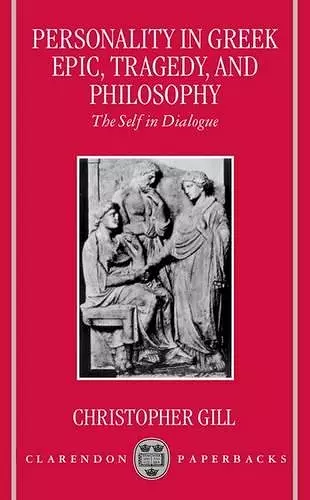Personality in Greek Epic, Tragedy, and Philosophy
The Self in Dialogue
Format:Paperback
Publisher:Oxford University Press
Published:23rd Apr '98
Currently unavailable, and unfortunately no date known when it will be back

Winner of 1997 Runciman Award
This is a major study of conceptions of selfhood and personality in three key areas of ancient Greek thought: epic, tragedy, and philosophy. It is an original contribution to the history of ideas about the self, and combines this with striking new interpretations of the ethics and psychology of Greek literature and philosophy. All Greek is translated.This is a major study of conceptions of selfhood and personality in Homer, Greek tragedy, and philosophy. The focus in on norms of personality in Greek psychology and ethics. The key thesis is that, to understand Greek thinking of this type, we need to counteract the subjective and individualistic aspects of our own thinking about the self. The book defines an 'objective-participant' conception of personality, symbolized by the idea of the person as an interlocutor in a series of types of psychological and ethical dialogue. The book is both an original contribution to the history of ideas of personality and the self and also offers sustained analysis and new interpretations of a number of important topics in Greek philosophy and literature. These topics include: Homeric decision-making; the problematic hero in Homer's Iliad and Greek tragedy; monologues of self-division in Greek poetry; the tripartite division of the soul and ethical education in Plato's Republic; Aristotle's ideas about 'being yourself' and meeting the claims of others; Greek philosophical thinking about what it means to be fully 'human' or 'divine'. The book is shaped as a response to recent work in the philosophy of mind, ethics, personhood, as well as in classical scholarship. Clear and non-technical, with all Greek translated, the book brings out the continuing importance of ancient Greek thinking for contemporary study of ideas of personality and selfhood.
Part of the beauty of this book is that there are several conceptual dialogues taking place: there is the intra-psychic, the inter-communal, the dialogue between ancient poetry and philosophy and, perhaps, most importantly the dialogue between ancient and contemporary thought. Anyone interested in ancient notions of the 'self' will have to take this pivotal study into account and enter into a dialogue with it * Mind, Vol.110, No.439 (July 2001) *
Gill is very successful in demonstrating that the 'objective-participant' is the model most applicable to ancient notions of the self * Mind, Vol.110, No.439 (July 2001) *
offers an original and convincing interpretation of the psychological and ethical frameworks on which ancient notions of the 'self' were based * Mind, Vol.110, No.439 (July 2001) *
Chris Gill's book is a major contribution to the study of the 'self' in ancient thought * Mind, Vol.110, No.439 (July 2001) *
- Winner of Winner of 1997 Runciman Award.
ISBN: 9780198152323
Dimensions: 216mm x 137mm x 30mm
Weight: 682g
520 pages